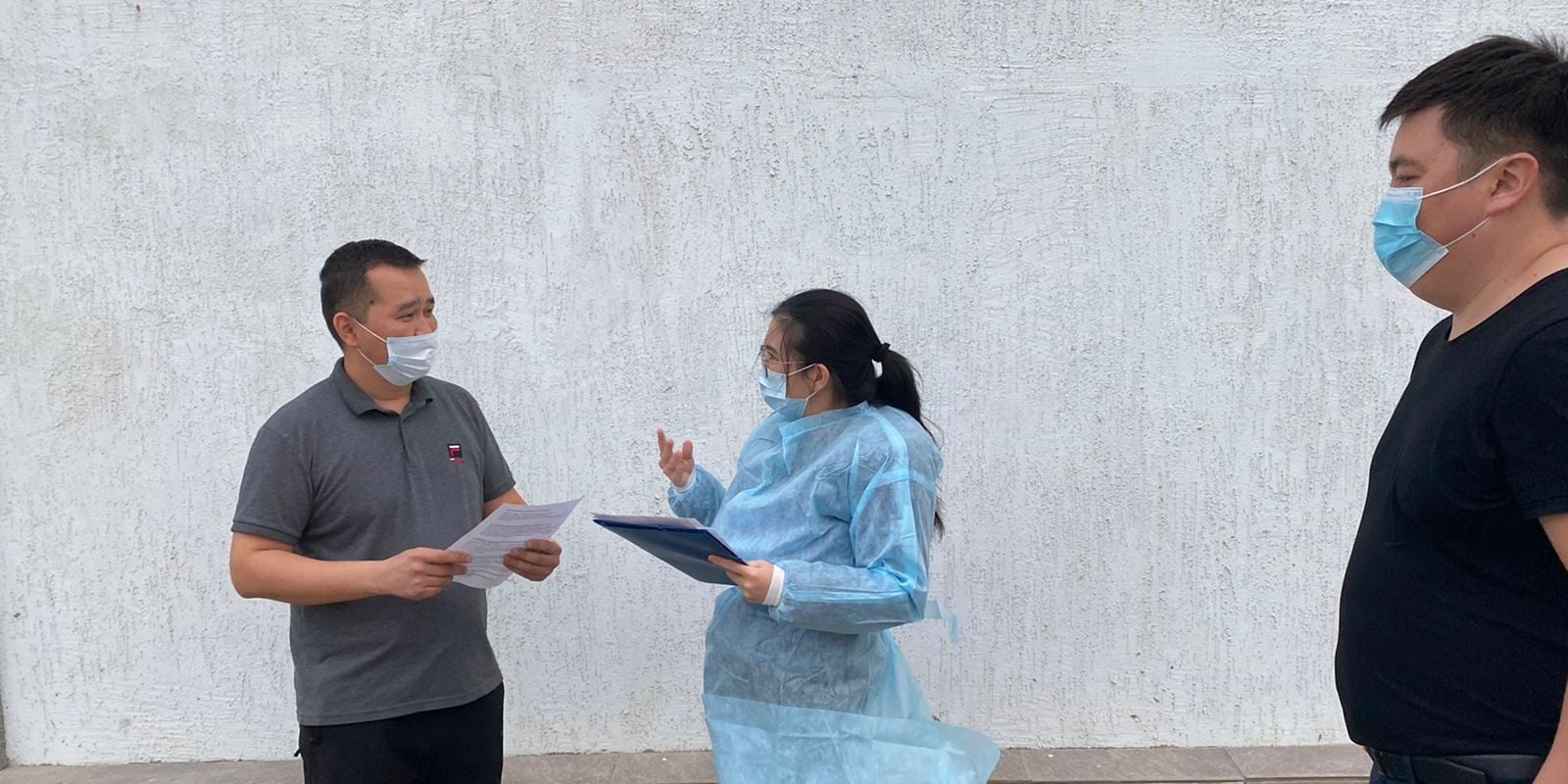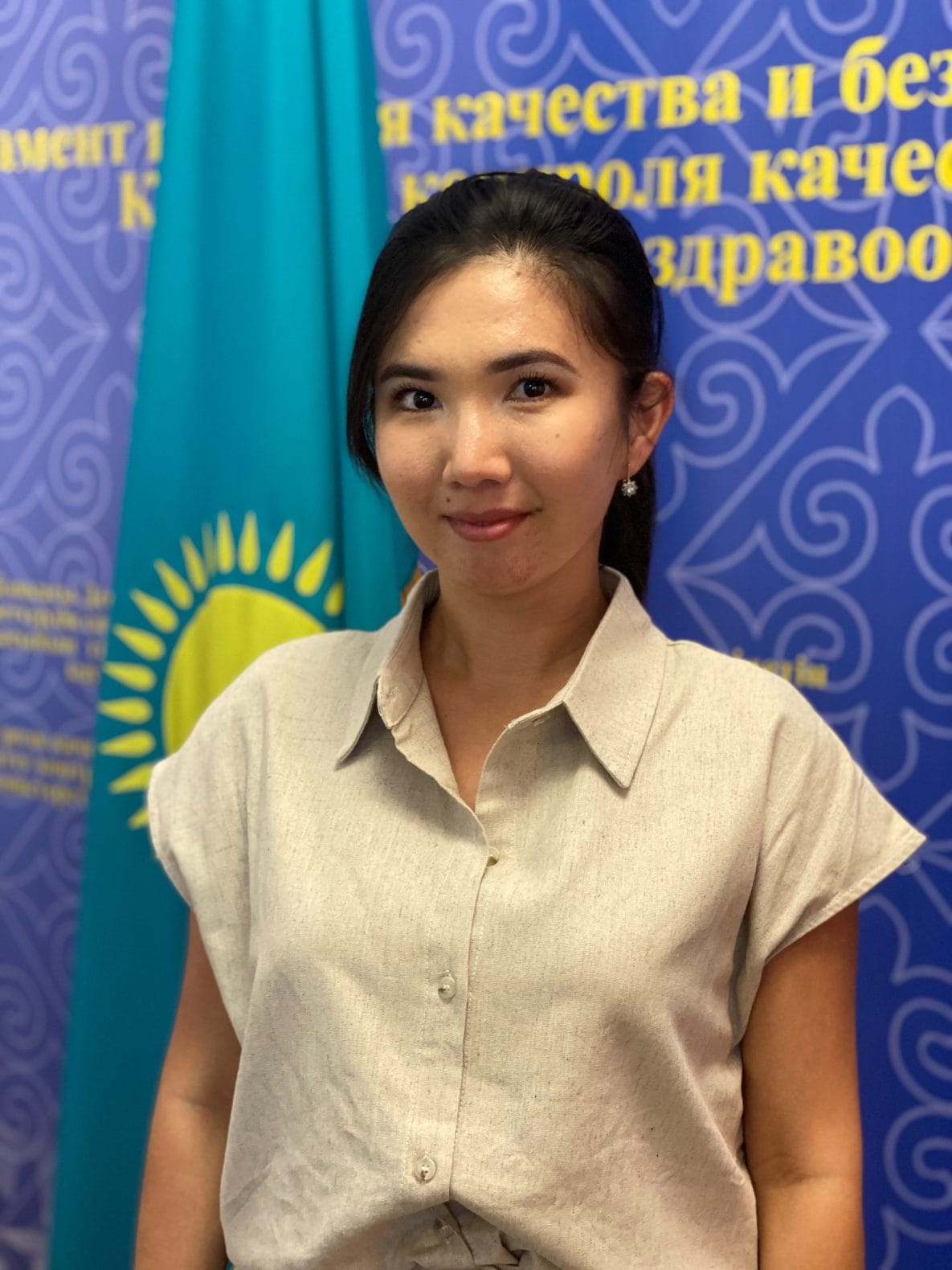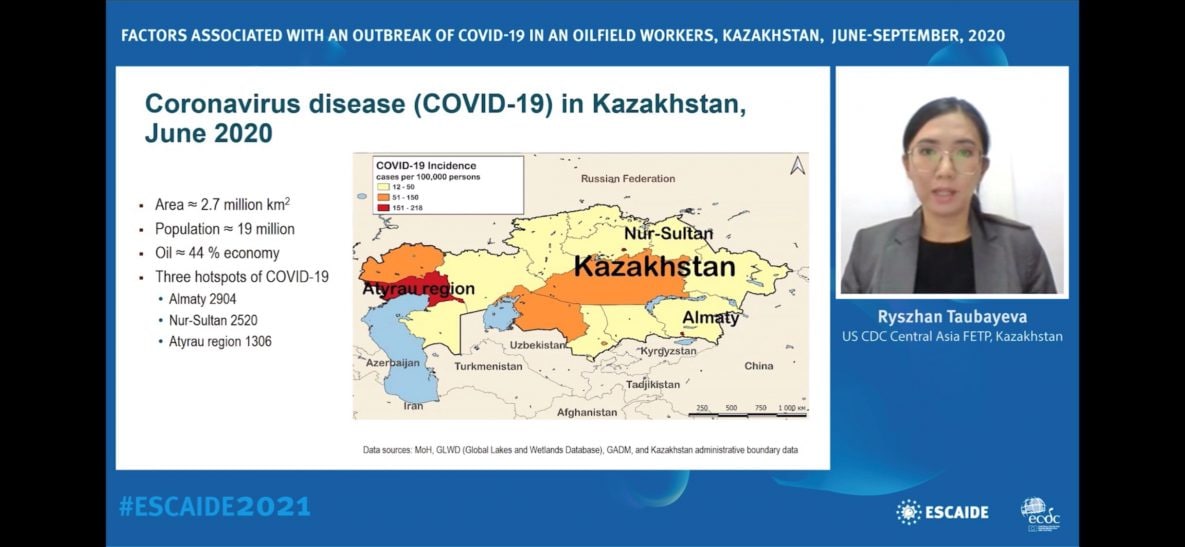Dr. Ryszhan Taubayeva: Showcasing Field Epidemiology Training Program Excellence in Kazakhstan
September 6, 2022

Dr. Taubayeva interviews a worker from a control group about compliance with COVID-19 prevention measures at a shift camp in Kazakhstan. Photo: Sayagul Nassyrova, Ministry of Health, Field Epidemiology Training Program
In 2018, Dr. Ryszhan Taubayeva joined the 15th cohort of the Kazakhstan Field Epidemiology Training Program (FETP) as a resident. During her training, she conducted a study on COVID-19 transmission among oil workers, titled “Factors associated with an outbreak of COVID-19 in oilfield workers—Kazakhstan, June–September 2020,” which won best abstract at the 2021 European Scientific Conference on Applied Infectious Disease Epidemiology (ESCAIDE) conference.
Ryszhan is now Head of the Department of Communal Facilities in the Atyrau Regional Branch of the Kazakhstani Committee for Sanitary and Epidemiologic Control. The committee is part of the Ministry of Health and oversees public health, sanitation, food safety, and epidemiology. Ryszhan leads outbreak investigations and develops prevention recommendations.
Ryszhan shares her FETP experience as a resident and the story of her award-winning research below.
Applying Field Training to Address Public Health Issues

Dr. Ryszhan Taubayeva at the ESCAIDE conference. Photo: Dr. Ryszhan Taubayeva
In 2013, I received my bachelor’s degree in Public Health from the Asfendiyarov Kazakh National Medical University, in Almaty, Kazakhstan. After graduation, I joined the Atyrau Regional Branch of the Kazakhstani Committee for Sanitary and Epidemiologic Control, working on infectious and non-infectious diseases and environmental health.
I liked my job but wanted to gain more experience and skills in outbreak investigations and disease control. When I learned about the two-year FETP, I immediately knew it would be perfect for me. I applied to the training program and was fortunate to be selected as a resident to help respond to the world’s most urgent health events. I worked on various outbreaks, including measles and a foodborne illness. I also conducted investigations on tuberculosis, viral hepatitis, enteric diseases, meningococcal disease, and COVID-19. During my time with FETP, I learned how to turn theory into practice, which is a skill I was able to use after I graduated in 2021.
After graduating from the program, I became directly involved in leading COVID-19 activities. Currently, I conduct monitoring activities and analyze disease trends in the region. In addition, I lead outreach campaigns, such as talking to the public and the media about the pandemic. I’m also on a committee tasked with designing mitigation guidance at the regional level.
The Challenges of FETP Work
I have experienced a few challenges while working on the COVID-19 response. For example, at the start of the pandemic, we had difficulty contacting and tracing people with COVID-19. This was mainly because we had limited information about this new disease and the measures we needed to implement to control its spread.
During my time in FETP training, I enjoyed field work the most. It was interesting, intense, and a tremendous learning experience. Of course, I also enjoyed my time in the classroom, taking courses in epidemiology and statistics from local and international experts. I really value the practical and theoretical training approach of the program and feel it’s very effective.
The Rewards of FETP Work
FETP taught me the crucial importance of investigating outbreaks, identifying transmission factors, and carrying out control measures rapidly. If an epidemiological investigation is done correctly, we can quickly control the spread of the disease. This will ultimately prevent many more people from getting sick and will save lives.
I applied those lessons while studying the COVID-19 transmission among oil workers in the Atyrau region. Located by the Caspian Sea, the Atyrau region contains some of the world’s largest oil and gas reserves. One of these giant oil reservoirs is the Tengiz field. It is the world’s deepest producing oil field and the largest producing reservoir known to date. Tengizchevroil (TCO), a joint venture of several oil and gas companies, operates the Tengiz field.
The oil and gas industries are vital to Kazakhstan’s economy. In fact, the city of Atyrau is known as the energy capital of Kazakhstan. When the COVID-19 pandemic affected oil workers in the Tengiz field, it had the potential to be devastating not only to the health of workers locally, but also to the national economy.
By June 2020, COVID-19 had infected 2,661 oil workers, leading to the suspension of two-thirds of the workforce. Despite the adoption of several prevention measures, 34% of workers continued to have outbreaks. Chevron, TCO’s largest co-owner, reached out to FETP to investigate the factors associated with the outbreak and recommend control measures. We identified ongoing transmission sources and recommended strategies to protect workers against COVID-19. As a result, TCO developed and tailored messages for the oil workers about personal responsibility and the importance of wearing masks correctly. The company also mandated isolation for workers who tested positive. This study was conducted before vaccines were available.

Dr. Taubayeva delivers her presentation at the ESCAIDE conference. Photo: Dr. Ryszhan Taubayeva
My description of the study received the award for best presentation at the 2021 ESCAIDE Conference. I was greatly honored to be recognized in such a way. It was a wonderful surprise, mainly because of the challenges I had with speaking English. I prepared rigorously for my presentation, and the award was the result of the strong, beneficial relationships I built with my FETP colleagues, mentors, and many partners around the world. I felt greatly honored to be recognized in such a way.
The Impact of FETP Work
Even though I am a recent graduate, FETP has already had a significant impact on my career. I can say with confidence that the knowledge and skills I gained helped me tackle the challenges of keeping people healthy. I believe that applying them can significantly improve the quality of epidemiological investigations in the region.
My advice to someone who is considering joining FETP is that they should be open to the challenges the program has to offer. Many public health experts strive to improve their skills in their careers. FETP has been recognized for providing public health services through a “hands-on” approach with an emphasis on fieldwork.